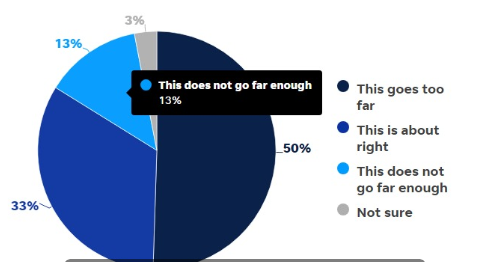
According to a recent Des Moines Register/Mediacom Iowa Poll, half of Iowans believe that the state’s new book ban law, which has led to the removal of over a thousand books from public schools, is overly restrictive. Meanwhile, a third of respondents view the law and resulting removals as appropriate. Thirteen percent feel the law doesn’t go far enough, while 3% remain uncertain.
READ: Navigating Amsterdam’s Waterways: A Canal Cruise Experience
Iowa Poll
In May 2023, Governor Kim Reynolds signed Senate File 496, a comprehensive education law prohibiting nearly all books depicting sexual acts from public schools, among other revisions, with an exemption for religious texts.
The Iowa Poll surveyed individuals on their opinion regarding “Iowa’s new law mandating schools to ban books depicting sexual acts,” which has resulted in the removal of more than 1,300 books from Iowa’s public school system. By mid-February, when the poll question was crafted, The Des Moines Register had documented over 1,300 book removals. As of now, approximately 1,820 books—615 of which are distinct titles—have been removed since the law’s enactment on July 1.
Although the state has been temporarily barred from enforcing the book ban due to ongoing legal proceedings, two lawsuits are underway.
The poll, conducted by Selzer & Co. from February 25-28 with 804 Iowa adults, carries a margin of error of plus or minus 3.5 percentage points.
One poll respondent, Michelle Leaverton from Urbandale, criticized book banning as “absurd,” emphasizing the importance of children having the freedom to choose what they read and to encounter diverse perspectives. Leaverton, a 51-year-old Democrat, expressed concern about the impact on her LGBTQ-identifying children and lamented the removal of classic novels like George Orwell’s “1984” and “Animal Farm,” viewing the law as further marginalizing LGBTQ and other underrepresented voices.
Interestingly, among parents with children under 18, there is more support for the law and book removals, with 39% considering it excessive, 40% finding it appropriate, and 16% believing it doesn’t go far enough.
Independent voter Tracy Alberts, 45, of Cedar Rapids, who participated in the poll, thinks the ban isn’t stringent enough. Alberts, a mother of three who works in human resources, advocates for parental control over school library content, suggesting that topics such as sexual content and politics should be excluded from school materials, except for historical purposes.